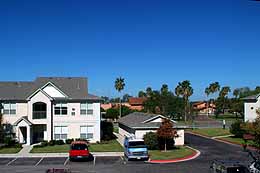

Be sure to check |
![]()
Travelogue of Our Roamings Fall and Winter of 2005 |
|
Wichita | San Antonio | Rock Hill | Tucson | Tulsa - Gordonville | Houston |
|
|
Brownsville, Texas
Our first stop in our new roaming lifestyle was Brownsville, Texas. Anna spent the first month there by herself, as I finished up my work for Lyondell Chemical. I joined Anna the day before our 12th wedding anniversary. The apartment furnished for us was in the Las Palmas apartment complex. These were nicely furnished apartments for business professionals. Our only complaints was the apartment had a tiny kitchen and was poorly lit, but part of this was that the windows all faced north (away from the sun). Here is the view from our balcony. Anna had already explored part of Brownsville, and I spend the first few of days doing the same thing. The one thing that really surprised me about Brownsville was the number of small ox-bow lakes, or resacas, that are scattered throughout the city. They really make nice little scenic nature spots all over the city. After the first spending little time together, Anna and I quickly set out to explore more of South Texas. We had been from Laredo to Brownsville once before, but that was a quick trip and had been several years ago. We explored many local nature and wildlife areas, of which there
are many in South Texas. Here are some of ones we visited: Laguna
Atascosa NWR, Sabal
Palms Audubon Sanctuary The Boca Chica Beach area, Isla Blanca County Park, and Adolph Thomas County Park were also great places to go. Later, we also traveled to Kingsville to attend the South Texas
Wildlife and Birding Festival. While there we saw an excellent raptors
show, including free flights outdoors, along with several interesting
seminars. Then we went on a personal wildlife
and birding tour of the King
Ranch, with just Anna and myself (plus the guide). This was
a wonderful tour and we only wished it was longer. But the driver
had to get back to pickup his next group. Anna saw her first wild
turkeys, in the wild that is, during this tour and luckily the males
were all strutting their stuff. When the weather wasn't cooperating, we spent more time exploring
around Brownsville or other nearby cities. The Glades
Porter Zoo in Brownsville is very nice Another specialty of Brownsville that we spent some time chasing
were the flocks of wild parrots Of course, we took several trips to South
Padre and Port
Isabel. We spend our time there walking the beaches looking
for shells, taking the dog for a walk The other part of South Texas that was new to us and somewhat of
a surprise was the huge agricultural industry. Particularly the
citrus groves We stopped at the Golden
Raintree Citrus Gardens in Weslaco
one day, before another trip into Mexico at Nuevo Progreso There were also large fields of cabbages, aloe vera, parsley, cilantro, tomatoes, and peppers. All of these were easy to find even in winter. We became a little spoiled by the easy access and prices at the many small product vendors and stands. Buying 2 to 3 pounds of tomatoes, bananas, limes, peppers, and onions for a dollar! Large bags of oranges or grapefruits for $2. Huge bunches of cilantro for .25 cents. Needless to say, we kept making a fresh salsa almost constantly! We also make a number of trips west to Edinburgh to visit the Hawk family, who are friends of Anna's parents, and are now our's too. We kept trying to go out on a deep sea fishing trip with them, but it just didn't work out. Maybe next time we are in South Texas? To get back to our trips to the wildlife and nature sites I would
like to list some of the animals that we encountered. A lot of big
white-tailed deer, javelina, feral hog (razorbacks), bobcat, gray
fox, coyote, green jay, great kiskadee, altamira oriole, vermilion
flycatcher, couch's kingbird, long-billed thrasher, white winged
dove, white tipped doves, common ground dove, green kingfisher,
ringed kingfisher, belted kingfisher, grove-billed anis, plain charchalaca,
buff-bellied hummingbird, harris hawk, white-tailed hawk, cooper's
hawk, osprey (everywhere), white-tailed kite, peregrine falcon,
aplomado falcon, chihuahuan raven, great horned owl, least grebe,
and many more other more common birds. Plus the three different
species of parrots
|
|
| Last Updated: |
